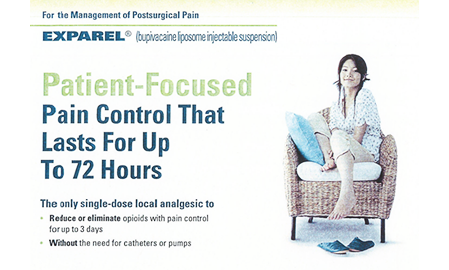The FDA’s bad-ad group has slapped Pacira Pharmaceuticals with a Warning Letter over a journal ad and educational flashcards that promoted the injection Exparel (bupivacaine liposome) for unapproved uses, violations the agency described as “extremely concerning from a public health perspective,” because they indicate the analgesic is more effective than it actually is.
The regulatory body also takes issue with an array of promotional materials that it does not go through piece by piece, but which the FDA’s Office of Prescription Drug Promotion writes “suggest an extensive promotional campaign by Pacira to promote the use of Exparel in surgical procedures other than those for which the drug has been shown to be safe and effective.” In this case, the professional promotional items indicate the injection is safe for procedures including knee arthroplasty, gastric sleeve, open hysterectomy and abdominalplasty.
The problem: Exparel is indicated for surgical pain related to bunion or hemorrhoid removal surgery, but the promotional items the FDA does directly address in this letter seem to indicate other, non-approved uses for the drug. As an example, the FDA highlights in its September 22 letter a Capturing Clinical Experience with Exparel guide which provides information about a physician’s experience using the drug when performing an open colectomy—a use that is not indicated in the PI. The FDA also acknowledges the disclaimers and disclosures provided in the piece but says that this is not enough because the materials give the “overwhelming impression that Exparel is safe and effective for cholecysectomy and colectomy.” OPDP also notes in a footnote that the disclaimers for this and a soft-tissue surgery case rundown include the note that it “is up to the individual prescriber to determine the relevance of the demonstration of efficacy and safety in these surgical models to their own surgical settings.”
The September 22 letter also takes issue with an up-to-72-hours of relief claim that pops up in the promotional materials (and on the consumer website—which is not addressed in the Warning Letter—as of 10am ET this morning). The letter notes there is nothing to support the claim, which appears in bold. A key reason is that it cites a clinical trial the FDA says is not sufficient to support the claim that pain relief can last up to three days, and because the clinical trial only found a difference in pain control during the first 24 hours, after which Exparel and placebo groups fared pretty much the same.
Despite the FDA’s objections, Jefferies analyst David Steinberg wrote in a Friday research note that the letter is unlikely to hurt sales and wrote that the FDA’s objections “seem at odds with the approved label.” Steinberg says Pacira’s management told his firm that the letter was a surprise because the company has been using similar promotional items for the past two years, without complaint. The drugmaker attributed the sudden attention to overall concerns surrounding opioid pain medications.







